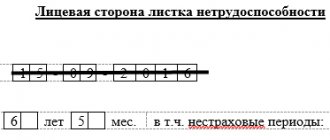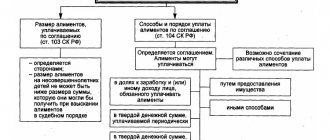| Grounds for transferring a minor to his father | Action List |
| Mom has no income due to unwillingness to work, being on maternity leave or for other reasons. | If the wife does not want to work, then this is confirmed by the following evidence:
If a wife is caring for a young child and is on maternity leave, then a man who wants to take his son or daughter away from her should:
|
| Mom's income is below the subsistence level | The father needs to prove to the court the following:
|
During a divorce, how long can the father see the child?
According to Art.
61 of the RF IC, parents have equal rights to raise a child. Accordingly, after a divorce, the husband has the right to see the child as much as he wishes. However, practice shows that wives try to take revenge on their husbands for the divorce, using the child in this matter. Based on paragraph 3 of Art. 66 of the RF IC, administrative fines can be imposed on a wife if she does not allow her to see her child. So, it all depends on your desire. First, you need to spell out all the specifics of meetings between father and child in the agreement that is signed by the parents at the time of the divorce. It is best to determine this issue in advance. Remember that divorce should in no way affect your child or the process of raising him.
- The Family Code of our country determines that parents are endowed with equal rights. And even if the child remains to live with the mother, this does not mean that she should refuse her husband to visit the child;
- If the wife prohibits her husband from visiting the child, in this case, you must immediately go to court and demand that fines be imposed on the spouse for violating the established legislation;
- The best option is to set the visiting time and days during the process of drawing up the agreement.
Practice shows that this moment is very relevant.
After all, not many women are able to be adequate after a divorce, and, unfortunately, they forget about the interests of their children. It is for this reason that various difficulties arise, and in the end, husbands, tired of fighting, stop seeing their child. Nevertheless, such mothers demand alimony with pleasure and frenzy. So, in any case, you shouldn’t leave things to chance; such women need to be punished by law. Need legal help? CALL: 8 (343) 383-59-64
https://www.youtube.com/watch?v=ytpolicyandsafetyru
Naturally, you shouldn’t break the law yourself, you need to act correctly. We recommend that you contact a lawyer who can correctly determine the tactics of your actions. After which, you will definitely need to collect evidence and file a lawsuit. After administrative fines are assessed, many women stop their resistance.
Children's rights when parents divorce. Division of children in divorce. I would like to note that the most important body in the “division” of children is the guardianship and trusteeship authority, in which the main “battle” for the child takes place. Often children find themselves in a similar situation due to their parents' divorce. Remember that the issue of determining the whereabouts of the child is decided exclusively by the court, which hears the parties to the process, one of which is a representative of the guardianship and trusteeship authority.
How often can the father see the child after a divorce? What is the least possible way to traumatize a child’s psyche as a result of parents’ separation? How to leave a child with the father during a divorce? And most importantly: how to resolve all these issues without unnecessary quarrels? The relationship between fathers and children, even within a complete family, is always less unconditional than the relationship between a child and his mother. This is how nature ordered: already at the physiological level, the mother is much closer to the child and is the main condition for his survival. Need legal help? CALL: 8 (343) 383-59-64
In accordance with the Family Code, parents have equal rights and responsibilities in relation to their minor children (Article 61 of the Family Code). Thus, you have the right to see your child as much as you need, to take him with you for a certain time. If you and your spouse cannot come to an agreement, the order of communication with the child will be determined by the court, taking into account all the circumstances and facts, as well as the interests of the child himself. Article 66 SK. Exercise of parental rights by a parent living separately from the child 1. A parent living separately from the child has the right to communicate with the child. participation in his upbringing and resolving issues related to the child’s education. The parent with whom the child lives should not interfere with the child’s communication with the other parent, if such communication does not harm the child’s physical and mental health or his moral development. 2. Parents have the right to enter into a written agreement on the procedure for exercising parental rights by a parent living separately from the child. If the parents cannot come to an agreement, the dispute is resolved by the court with the participation of the guardianship and trusteeship authority at the request of the parents (one of them). At the request of the parents (one of them) in the manner established by civil procedural legislation, the court, with the obligatory participation of the guardianship and trusteeship authority, has the right to determine the procedure for the exercise of parental rights for the period before the court decision enters into legal force. 3. In case of failure to comply with a court decision, measures provided for by civil procedural legislation are applied to the guilty parent. In case of malicious failure to comply with a court decision, the court, at the request of a parent living separately from the child, may make a decision to transfer the child to him based on the interests of the child and taking into account the opinion of the child. 4. A parent living separately from the child has the right to receive information about his child from educational institutions, medical organizations, social welfare institutions and similar organizations. The provision of information may be refused only if there is a threat to the life and health of the child on the part of the parent. Refusal to provide information may be challenged in court. If you file a claim with the court to determine the order of communication with the child, you will be able to present to the court a schedule convenient for you, time intervals, hours of communication per day, walks, trips together in the presence or without the presence of the mother and other persons. You can also determine until what age the child should follow this schedule. The mother of your child can challenge certain conditions, and the court will decide how much to provide you with what you are looking for. So ask for more, including communication - without the presence of the mother. If you are thinking about fishing and vacationing together, then plan it now, include it in the requirements, order and schedule of communication, while the baby cannot go anywhere.
Article 66 SK. Exercise of parental rights by a parent living separately from the child 2. Parents have the right to enter into a written agreement on the procedure for the exercise of parental rights by a parent living separately from the child. If the parents cannot come to an agreement, the dispute is resolved by the court with the participation of the guardianship and trusteeship authority at the request of the parents (one of them). At the request of the parents (one of them) in the manner established by civil procedural legislation, the court, with the obligatory participation of the guardianship and trusteeship authority, has the right to determine the procedure for the exercise of parental rights for the period before the court decision enters into legal force.
The Family Code states that mother and father have equal rights in relation to their common children (Article 61). What is meant by parental rights? First of all, this is the right of a parent to raise a child, represent his interests before the state and other persons, communicate, live together, and provide financial support. In the event of a divorce, it is not entirely possible for one of the parents to fully exercise their rights, since the child remains to live with someone alone.
In Russia, the practice is that after a divorce, children remain in the care of the mother, and the father can see the child at an agreed time, communicate, and help him financially.
Parents make mutual decisions about where their children will live. But if there is a conflict between them and they cannot decide with whom the baby will live, the dispute is brought before the court. This body is authorized to decide with whom the child will be better and more comfortable.
So, if a child stays with his mother, then his father has every right to communicate with him, see him, and take him home. Of course, the procedure for participation in raising the child must be agreed upon or determined by a court decision if the parents were unable to agree.
Therefore, the situation when the ex-husband took the child to his place is twofold: on the one hand, the father is not doing anything illegal, on the other hand, it is necessary to take into account the circumstances under which this happened.
What to do if the father takes the child without the mother’s consent, until there is a court decision on this issue?
There are different situations during divorce. In some cases, the mother is not trustworthy. She does not monitor the child, leaves him alone and lives the way she wants, regardless of the child’s immediate needs. Even if the court orders one or more children to remain with her, dad can take them away from her. According to the law, divorced parents are not exempt from the responsibility to care for their offspring, so in this case, a responsible dad can and probably is obliged to take the children away from such a mother.
The ex-husband took the child: how to return it legally?
If, on the basis of the initial decision, the children were left with the mother, the father, firstly, can file an appeal, and secondly, initiate a counterclaim, the subject of which will be the issue of the well-being of the children living with the mother. For example, when a mother is unable to provide an adequate standard of living for her children or suffers from bad habits that also negatively affect the well-being of the children, the court may reconsider the original verdict and transfer them to the father.
- The degree of attachment of the child to each of the parents. If, based on the testimony of the parties, it is difficult to reliably establish a child’s preference, then a socio-psychological examination is used.
- Affection for brothers and sisters. This aspect is considered in detail if you want to separate the children. If, if there are two minors in the family, the husband wants to take one child and leave the second to his wife, then, in the absence of objections from the parents, a gap is considered from the point of view of children's attachment and the possibility of separate living and communication in the form of meetings.
- Childhood. The indicator is important from the age of ten, since in court the child has the right to express his opinion about the preference of the parent with whom he wants to live together and be heard. If the child is in infancy, requiring physiological presence with the mother, then this issue cannot be considered.
- Moral and other personal qualities of parents. To assess the moral and ethical character the following are suitable:
- characteristics from service; certificates of no criminal record; documents confirming the absence of registration from drug treatment and psychoneurological institutions; Testimony from employees of child care institutions, co-workers and neighbors.
- the type of activity of the parents, whether or not it involves frequent business trips; a mode of operation that allows sufficient attention to be paid to the educational process; financial and marital status.
You may like => When Receiving a Birth Certificate, It’s Enough Only for Mom to Go to the Registry Office
Father kidnapped a child
Women are very emotional individuals. They are so worried about their child that they may often misjudge some of the actions of the baby’s father. For example, dad took the child to his place for the weekend and does not give it back. Mom immediately begins to think that he stole the child.
First of all, it is necessary to find out why the child has been with his father for a long time. Perhaps he fell ill and his father did not have time to report it. Or maybe the father took the child to grandma, etc. In this case, there can be no talk of any abduction if the father does not hold the child against his will.
The application must be accompanied by documents confirming that the baby lives with the mother. This may be a court decision or an agreement to determine the child’s place of residence, concluded by the parents during the divorce. It would not be superfluous to provide a certificate of family composition, which also indicates that the mother and child live together.
The father's actions in relation to the child cannot be qualified under Article 126 of the Criminal Code of the Russian Federation (kidnapping). In this case, there is a violation of a court decision or the terms of an agreement on determining the child’s place of residence.
We suggest you read: How to obtain child custody during a divorce
If the parent was at one time deprived of parental rights, then he lost the legal connection with the child. Accordingly, what can be prosecuted for without permission is kidnapping under Article 126 of the Criminal Code.
Olga
Have you ever met swindlers, terrible scammers? For me, unfortunately, yes. In the spring of 2021, I met, as it seemed to me then, a wonderful man, our relationship developed rapidly, he communicated in social circles, at that time I had a stable material income, several expensive cars, a large apartment. The man I was dealing with was a real gigolo, a psychologist and a professional manipulator.
Alyona
There is a document confirming that Maxim has a mental disorder and is prone to forming superideas. Also, Psychological Dispensary No. 1 of the Krasnoyarsk Territory has proven that mental violence is carried out against children on a daily basis. There are many records of Maxim's inappropriate behavior. I have two court decisions on my hands. The latest about the restriction of Maxim Koliberda’s parental rights, but even with all this, no decisions or pieces of paper help me.
When determining the place of residence of common children, they are guided by the norms of the RF IC and the Convention on the Rights of the Child, adopted on November 20, 1989. In Art. 9 of the document states that a minor should not be separated from his parents except in cases where this is necessary for his good.
You may like => How to Find a Cadastral Engineer for an Internship
Determining the child’s place of residence
Many parents, after a divorce, do not draw up any legal documents regarding the child’s place of residence. This issue is resolved by verbal agreement. Please note that this may lead to adverse consequences in the future.
For example, if a father took a child from kindergarten or school without the mother’s consent, then such an action is completely legal. On the simple grounds that he has equal rights with his mother. In addition, kindergarten teachers or teachers cannot know the details of the family life of their student’s parents; therefore, they cannot refuse to give the child to the legal parent.
It’s another matter if there is a document that establishes the order of raising a child. Thus, the court decision may determine the place of residence of the minor, the participation of the second parent in upbringing, namely: on what days the father can see the child, whether he can pick him up from educational institutions, whether the mother will be present when the father and the child meet.
Incompetent parents
If the parents of the child being adopted are recognized by the court as incompetent due to mental illness, not controlling their actions, and not being aware of them, their consent to the adoption and presence in a closed court hearing on the issue of adoption of their biological child is not required by law.
It goes without saying that, due to the nature of their illness, they are not able to raise their children or give them proper care. These people cannot consciously express their desire - to give or not consent to the adoption of a child.
For these reasons, their consent is not required by law.
But, at the same time, if the child’s parents are partially limited in legal capacity by a court decision, in such cases consent to adoption is required, since they are limited only in property rights.
Schedule of communication with the child
It is the parents and how their separation occurs that determines how it will affect the child: whether the parents’ divorce will become the deepest stress for him, which will leave its mark for the rest of his life, or whether such a situation will be another stage in his life, which will not in any way affect his cheerfulness and trust in others.
The younger you are, the less time you have to communicate with your father. Because of which? Why is that? Is this the practice of each of the judges or is there a common age criterion for all judges. Well, for example, 1.5 years - 2 hours, 2 years - 3 hours, 2.5 years - 4 hours. In relation to my situation, the mother writes to the guardianship that leaving the child with the father overnight may have a negative impact on the mental state of my son, my son is 1.8 years old. You strive to save your family, thinking about the well-being of your children.
That is, you need to show that you are a serious family man who is not inclined to give in to emotions, preferring to wait until they cool down. Secondly, at the trial it is necessary to emphasize your role in raising your children. State that you do shopping, children's leisure, go to hospitals, spend money on the best teachers. In general, in the minutes of the court hearing there should be a phrase stating that you did not shy away from raising children and actively participated in the life of the family.
What rights does he have, and what rights do I have, if he violates the schedule established by the court. And do you need any certificates from psychologists stating that after communicating with your son the child behaves inappropriately? Because my father’s parenting methods really harm not only the psyche, but also the health of my son. Thank you in advance. The claim is called “to determine the order of communication with the child.” But before you formulate anything, pay a visit to your guardianship authority. Cases where children grow up in an incomplete family (usually without the constant presence of a father) are not uncommon. They say that social reasons are to blame - emancipation, changing family stereotypes, money, finally. Perhaps the first thing that feminism has achieved as a phenomenon is the priority right to a child: 95-97% of children after their parents’ divorce live with their mother. Need legal help? CALL: 8 (343) 383-59-64
Instead of maintaining normal relationships, ex-spouses use children as targets or weapons in their fight against each other. Often the mother prevents communication with the child after a divorce, and the father demonstratively refuses to raise and support the children. And everyone only suffers from this. In this article we will try to understand the ups and downs of communication between parents and children after a divorce. And determine the procedure for overcoming controversial issues.
Since in most cases, after a divorce, the child remains with the mother, it is the mothers who become opponents of full communication between father and child. The mother begins to abuse her rights and infringe on the rights of the father for a variety of reasons (including out of resentment and a desire to take revenge on her ex-husband). She herself determines the order of meetings between the father and the child, limits the time they communicate, and sometimes does not allow them to see each other at all. Sometimes the father is not at all embarrassed by this state of affairs. But as a rule, the father defends his legal rights to communicate with the child after a divorce.
Mothers ask whether it is possible to legally prohibit a father from seeing his child? Yes, in some cases, communication between a father and a child may be limited by the court - if this communication is harmful to the physical or psychological development of the child. For example, if the father leads an immoral lifestyle, uses alcohol or drugs, insults his ex-wife, turns the child against the mother, and the like. If the father’s behavior does not cause any complaints, there is no reason to limit his participation in the child’s life. Parents should reach an agreement on how to communicate with their child. In what form - we will consider further.
Parents can determine the frequency and duration of meetings between father and child (as well as other features of their communication, depending on the circumstances) in several ways. The law provides for the possibility of drawing up a written agreement or going to court. In practice, an oral agreement between parents is also possible.
It’s good if the former spouses maintained human relationships after the divorce. If parents understand the importance of the child's communication with both mother and father, and are equally responsible for his upbringing, they can agree verbally. No documents are required. For example, according to a verbal agreement, the father takes the child to his place every weekend, and the mother does not control the communication process, since she recognizes the ex-husband’s right to raise their common child.
Question. My wife and I divorced, we have a 10-year-old child together. My wife and child live in another city, quite far away - 200 km away. To see my son, I come to see him at least once or twice a month. But my ex-wife is wary of letting the child go with me, so I only have one day at my disposal.
Does the wife have the right to dictate the terms of meetings with the child? Is it possible to enter into a written agreement with your wife? If one parent abuses his rights or infringes on the rights of the other parent, it would be wise to formulate these rights in writing. For example, if disputes arise between the parents about how often meetings with the child should take place, for how long should continue and in what form it should take place, it is necessary to provide for this in the agreement.
It happens that after a divorce, the relationship between the former spouses is so destroyed that it is impossible to peacefully agree on communication with the child. And it happens that a previously concluded written agreement is simply ignored by one of the parents. In this case, the dispute is resolved in court with the obligatory participation of the guardianship and trusteeship authority. Question.
My son divorced his wife. The common child lives with his mother. The ex-wife strictly limits the time spent together between father and child and is personally present during their communication. And judging by how insecure and fearful the child behaves during these rare, short and very uncomfortable meetings, the mother is turning the child against the father. How to achieve normal meetings with a child after a divorce? Depending on the circumstances, the following claims may be filed:
- on determining the order of communication between a mother or father and a minor child;
- on restricting communication between a father or mother and a child after a divorce (if the circumstances specified in Article 66 of the RF IC occur);
- on the procedure for communication with the child of other relatives (specified in Article 67 of the RF IC).
Disputes between parents about children are resolved exclusively by the district court, and a statement of claim must be filed there to determine the order of communication with the child. Do you need help from a family lawyer? CALL
We suggest you read: How to register a house in a village as your property after the death of your parents
One of the attachments to the statement of claim may be a schedule of communication with the child. This document contains an approximate or exact schedule of meetings between parents and the child, their time and duration, place and method, as well as other forms of communication (telephone calls, correspondence).
It is advisable to include in the schedule the possibility of spontaneous, unplanned meetings. After all, even the most organized mother may suddenly need help with her child, or the busiest father may have free time to meet with the child. You will have to create a schedule for communicating with the child yourself, depending on the circumstances and characteristics of family relationships. If serious difficulties arise, you should seek help from a lawyer.
If a court decision to determine meetings with a child has entered into legal force, but one of the parents still acts in his own way, preventing the child from having a normal relationship with the other parent, he can be held accountable. There is a fine for such a violation. For systematic violation of the order of meetings determined through the court, one of the parents has the right to demand a change in the child’s place of residence (for example, if the mother categorically denies the father the opportunity to see and raise their common child, the father can ensure that the child lives with him). How often can a father see a child after a legal divorce? The main goal of the legislator when creating family law norms is to give parents and children the opportunity to communicate with each other even when the relationship between mom and dad ends. This is especially important because divorce can be a serious psychological trauma for both the child and his parents. At the same time, the parents themselves ultimately do not try to maintain relationships with each other, so that in the end the child is not deprived of the attention of one of them. In fact, there are constant disputes and conflicts that only worsen the situation.
Moreover, psychological pressure is constantly applied to children; they are used as a means of blackmail and struggle between parents. The main mistake is limiting the rights of one of the parents in communicating with their child.
It is very important to understand how the father should act, since most often it is his right that is limited when the mother does not allow him to freely see her child. For such situations, there is a procedure for determining the schedule and order of meetings with children, and solutions are also allowed that completely allow the father to visit the child and communicate with him at any time.
How often can a father see a child after a divorce? Deciding how and when the father will meet with the child is a very important point, since divorce always entails the former spouses living in different places, and sometimes in different cities. All this negatively affects the child, depriving him of the opportunity to see his father regularly. Also, the father may simply be busy with work, which will require a special approach to allocating time for meetings with children. At the same time, it must be remembered that it is impossible to somehow limit meetings between the father and the children without sufficient grounds. Article 61 of the RF IC states that each parent has the same rights in relation to their children together, that is, the father has the opportunity to meet with the child whenever he wants, at any time and on any day. Parents can also come to an agreement by independently thinking through a plan for each of them to communicate with their child. When drawing up a specific schedule, many factors must be taken into account, namely the desire of the child himself, as well as the father’s ability to meet with him, because a man can work or live in another city, which will greatly reduce the number of meetings with children.
Do you need help from a family lawyer?
That is why it is always possible to set a certain frequency, for example, specific days in a month when communication could take place.
Poor relationships between ex-spouses lead to disputes. The mother restricts the father's meetings with his children, and as a result, the latter has to go to court. In this situation, it is the government agency that will decide what the communication schedule will be, based solely on the interests of the child.
All this creates a significant time frame, which, one way or another, limits the father’s right to communicate with his child. All this is a consequence of the mother’s prohibitions, which are very often unfounded and based only on personal hostility.
Judicial practice mainly relies on such issues as places of meeting with a child, which must be determined based on objective circumstances.
It is always important to take into account the residence of each party; perhaps the father has moved to another city, which will complicate the scheduling procedure. At the same time, the court cannot limit the meeting place only to the child’s residential address; the father has the opportunity to meet with the children in any chosen place.
The court, most often, is inclined to believe that the father must spend time with the child in various entertainment and leisure places. In this case, of course, the employment of the child himself is always taken into account, because he can attend kindergarten or school, which means that weekdays are not the best for meetings. The same applies to the father, who most likely works and therefore does not have the opportunity to go to his child at any time. All these aspects should be studied in detail and taken into account when creating the most convenient and appropriate communication schedule. The court's decision regarding the schedule of meetings between the father and children should always be as specific as possible. That is, the judge must establish clearly defined days when the man can come to his children.
If there is no such instruction, this will create uncertainty and there will be no opportunity to plan the child’s leisure time, the process of his education and rest. That is, such a decision can significantly affect the interests of the child, which should not be the case. Another important factor is the age the child has reached. As a rule, young children under three years of age, according to the court, do not need communication with their father so much, which means the number of days and hours may be minimal.
The older the child, the more he requires the attention of both parents, especially if we are talking about a boy. The connection with the father will also play a role, how close the child was to him; the lack of a strong attachment can cause a reduction in time for communication.
Schedule of meetings between a child and his father after a divorce
The best option to avoid conflicts and not create a stressful situation for the child is an agreement. Parents can simply agree among themselves. Such an agreement can be either oral or written.
Such an agreement may contain all aspects relating to communication between one of the parents and the child. Days, hours, duration, places and so on. All this can be determined peacefully by finding a compromise.
When accepting such an agreement, it is important to understand that any excessive restrictions will harm the child; the RF IC also warns about this:
- Article 55 of the RF IC states that children have the right to communicate equally with all relatives, and divorce is not an obstacle to this;
- Article 66 of the RF IC states that all the rights and obligations that spouses have in relation to children are the same for them;
- Article 65 of the RF IC states that any exercise of parental rights should not contradict the interests of the child; first of all, physical and moral harm is not allowed;
- Article 66 of the RF IC states that a father or mother who does not live with the child can fully exercise their right, participate in his upbringing and maintain communication.
Lawsuit, husband threatens to sue the child
If my husband took the child away without permission, what should I do? If the authority to communicate with the child, determined by the court, is exceeded, the mother has the right to state non-compliance with the court order, up to and including recording the fact of abduction. If the court decision is not complied with, the measures provided for by legislative acts on administrative offenses and enforcement proceedings may be applied to the guilty parent on the basis of clause 3 of Article 66 of the RF IC.
Procedure for communication after the trial
I have this situation. I filed for divorce and in a month they will call us. Before the divorce, I decided to live with my sister. Because he comes to my parents and makes trouble. He beats my parents. He comes with friends. So the other day he came to my sister , her husband didn’t even let him out the door. And he came for his eldest son. He said that he would bring him in two days. So he took him away and now doesn’t want to give him back. He also demands documents. And when we lived together, we bought an apartment together .he was obliged to register us there. But he didn’t. So he also sold this apartment and skipped. What should I do? How to pick up my son. And I’m afraid to go for a divorce. What if he catches me and does something.
Often a husband, not wanting a divorce, threatens his wife to take away the child. The court considers all the circumstances, arguments and listens to the testimony of witnesses. The desire of the child himself can play an important role in this matter. After 10 years, the court listens to his opinion.
Judge's criteria when justifying the time of communication between a child and his father
In Russia, the law does not prohibit the departure of a minor citizen with one of the parents. This means that the father can take the child to any country without the mother's permission. This rule is spelled out in Art. 20 Federal Law No. 114 “On the procedure for leaving the Russian Federation and entering the Russian Federation.”
On the one hand, taking a child abroad by one parent is very convenient. Especially if the parents do not live together. There is no need to look for the other parent to obtain permission if the child urgently needs to be taken to another state for treatment, education or vacation.
We invite you to familiarize yourself with: GPC Agreement and Contract Differences
On the other hand, if the relationship between the former spouses is difficult, one of them can take the baby away without any problems. However, there is a legal mechanism to protect the interests of the child in such a situation.
If the mother is worried that the father may take the child abroad, it is necessary to file a lawsuit in court for disagreement with the departure of the minor. This right is provided for in Art. 21 Federal Law No. 114. If there is a judicial act that has entered into legal force, the customs service will not allow the parent and child to pass. Thus, it will be impossible to leave the Russian Federation.
In cases where an agreement cannot be reached, the guardianship and trusteeship authorities, as well as the court, come to the rescue. It is these authorities that will resolve the conflict that arises regarding communication with children and the implementation of education in general.
Here the court will rely on a large number of factors when determining the order of communication with the child: the age of the children, health, psychological indicators, namely the level of attachment to each of the parents, and of course, the conditions of the meetings, the possible setting. The complexity of such trials is that Every family is unique in its own way.

In some cases, their own problems, conflicts, difficulties, conditions. All this is important to take into account when making a decision, and you definitely cannot act based on previous cases. In each family, you can individually determine the characteristics of communication between spouses, children with them and other similar aspects, which plays a significant role in the formation of schedules.
Often, the father does not take into account the interests of the child when establishing the order of communication with him; he wants to take the small child away for a long time, which is impossible, since he may need the mother’s company too much due to his age. And there are a lot of such examples, so each family needs to be approached individually.
This is usually due to the fact that a child at a young age becomes more attached to his mother, especially if he lives with her constantly. The father is obliged to take this factor into account.
Often the schedule proposed by the father involves the child staying with him at night, for example, when the man takes him away for the weekend. This is possible, but only if the court is convinced that the father has suitable living conditions for this.
When a man does not have his own apartment or house, he will be denied this type of communication, as with any other long-term pastime.
Another important point may be the health status of the children. They often have some diseases, including chronic ones. In this case, long-term departures may also be prohibited. It is necessary to provide medical certificates and confirmation from doctors that the chosen holiday option will not be harmful to health.
He also needs to properly provide medical examinations, tests and other medical services, which will be problematic to provide upon departure. All this may be grounds for denying the father the opportunity to spend an entire vacation with the child.

The next important evidence is the opinion of the guardianship and trusteeship authorities about the possibility of spending the maximum amount of time with the father. They examine all conditions, including the characteristics of the man himself and the relationship between him and the child. As a result, a conclusion is issued, which the court looks at first when making an appropriate decision.
Typically, the conclusion of the guardianship and trusteeship authorities is not based on how the process of raising a child is going, or what the relationship is between him and his parents. The point is that the mother, when she is against a certain order of meetings between the father and the child, presents reasonable facts confirming the reasons for her reluctance.
This is exactly what the guardianship and trusteeship authorities look at. If such arguments are not presented, then the conclusion will be in favor of the father. It is also necessary to provide evidence refuting the conclusions made by the guardianship and trusteeship authority. Any party can do this.
Evidence for resolving this issue can include various types of medical certificates and conclusions, characteristics and certificates from a school or kindergarten. The result of the psychological examination is also recognized as evidence.
The court may refer to it when making a decision. Other types of evidence are possible, the main thing is that they legally refute the ability of one of the parents to exercise their rights or, on the contrary, limit them. Special attention must be paid to psychological examination. It helps to understand the relationship between parents and children.

Accordingly, the higher the attachment indicator, which is determined through psychological tests and techniques, the more time the child needs to contact the parent. As a result, all these techniques make it possible to confirm or, conversely, refute the arguments presented by the parents in the trial.
Limiting communication between the father and the child Whatever grievances remain after the divorce, a woman cannot prohibit her ex-husband from seeing their joint child. The rights of both spouses are equal, regardless of who the child lives with. In order to limit the rights of a man, you need to have very strong arguments. The mother must understand that any ban on communicating with children is a violation of the law and an extra reason for the father to file a lawsuit in court.
However, it is possible to rid the child of the father’s company, but only if he negatively influences him, puts pressure on him, or, on the contrary, pampers him, depriving the mother of the opportunity in the future to satisfy the needs he has formed.
If the woman can prove such influence, then the court will be able to rule in her favor and limit the father to a clearly established schedule. Meeting conditions may vary. Limitation may be possible due to the participation of witnesses in meetings. And of course, the main reason for refusal is failure to pay child support and failure to fulfill responsibilities as a parent.
https://www.youtube.com/watch?v=ytaboutru
Need legal help? CALL
In what cases can the father take the baby away from the mother?
- the child’s mother has daily or shift work;
- the mother has a job that requires travel;
- the mother does not have the appropriate conditions and therefore cannot guarantee comfortable accommodation for the child;
- the child does not want to stay with his mother;
- A woman is characterized by hysteria and imbalance.
Conflict in divorce over children
Women whose husbands threaten to take away their children are manipulated. This is a common method of putting pressure on a woman who understands well that the father will not be able to provide decent care for the baby (after all, the man will need to cook, feed the heir healthy food, wash, iron, and study homework with him).
19 Jun 2021 gmurist 8
Share this post
- Related Posts
- Do Kindergarten Teachers Have Benefits When Enrolling Their Child in Kindergarten?
- What Documents Are Needed in the Work of a Caretaker?
- Benefits of a Preschool Teacher
- Indexation of Payments Compensation for Health Harm According to Chaes
Some nuances
Often the spouse, out of resentment, wants to annoy his ex-lover. And for this he uses such a method as manipulation with the help of a child. First of all, it is necessary to understand that personal squabbles between a man and a woman can lead to a child suffering. His physical and psychological health, mental comfort is the only thing that parents should care about.
To avoid situations where the father picks up the baby, takes him to another city, etc., it is better to establish good friendly relations with your ex-spouse. At the same time, it is still worth documenting the legal relationship regarding the upbringing and maintenance of the child. And in the event that the father may pose a danger to the baby, it is advisable to raise the issue of depriving him of parental rights.






